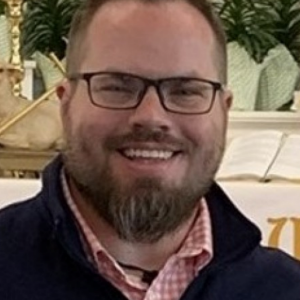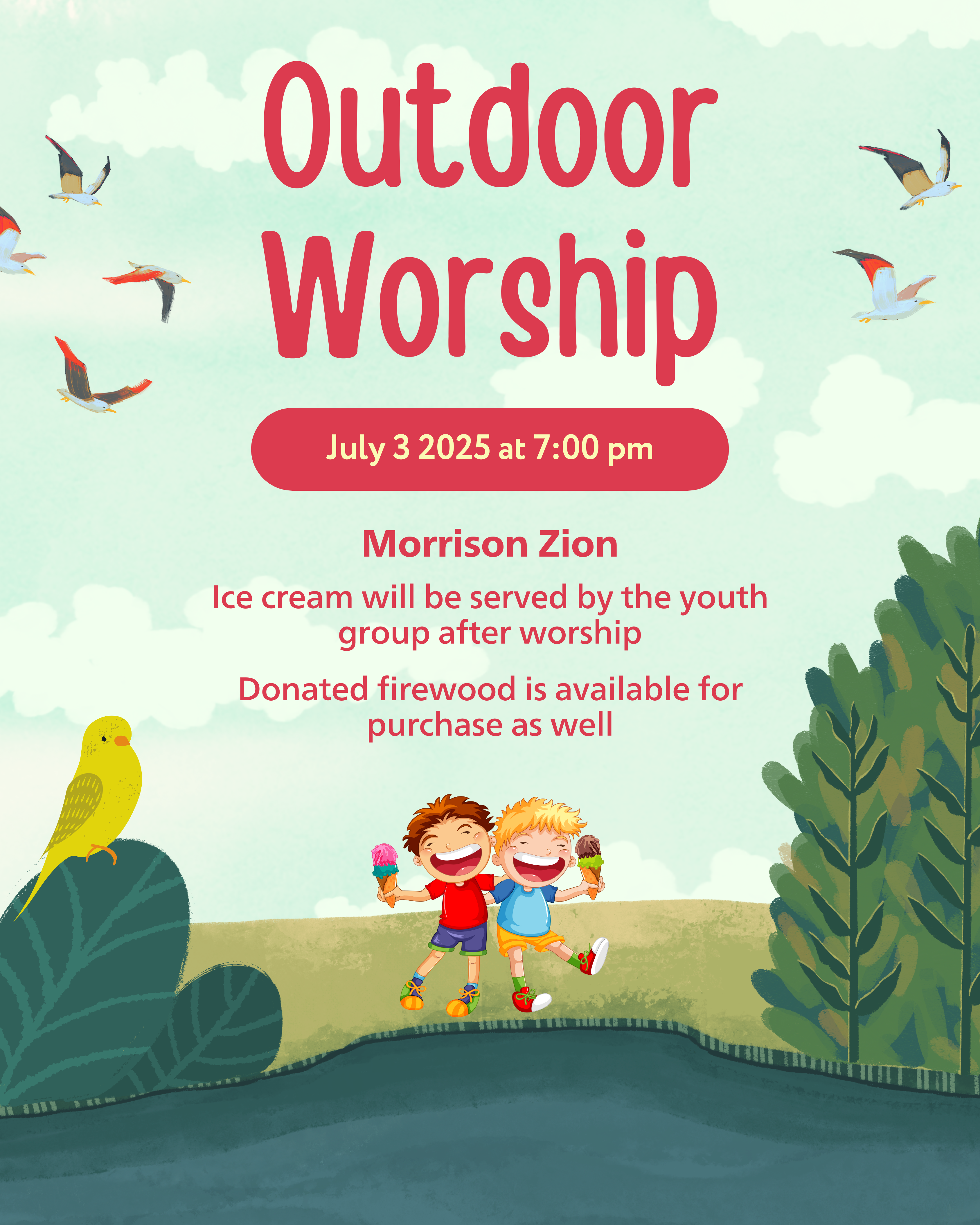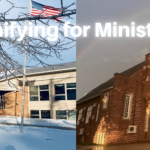Lord, Keep us Thankful!
There is No One like You
Thankful for what _____ has ______
Thankful for ______ ____ has made ____
_____ to _______ Him
Thankful for what _____ ______ ____
Welcome to worship today at Morrison Zion Lutheran Church. We exist to glorify God. We have set out to do this by gathering around the Gospel so that we may grow in the Gospel and go to others with this Gospel.
Grace and peace to you from God our Father and from Jesus Christ, our Lord:
In the last few weeks, there have been a few videos that became popular and went viral online. They kind of have the same theme of recent college graduates who were talking about their workload. The most popular one that was commented on and shared was a girl who has been out working for a little while. She finished college and she is working a 40-hour week at the YMCA. She is talking about how early she has to get up to get to work at 10:00 a.m. When she gets home from her day, she has to make food, then she has to do planning, and then she is tired and doesn’t have time for herself or to see friends and hangout. This 40-hour work week is just so rough. You might be sitting there and saying, “Forty hours? That’s nice!” Or you might be thinking back to some jobs that you had. She works at the YMCA. I think more of an office job. But maybe you worked on the farm and that’s a little more hard labor. And what were your hours? Not 40 hours, but what needed to be worked. Maybe that’s kind of your job now.
What is the reason for bringing that up? There are all sorts of comments on that video. Some say “She’s right! Why do we have to have it this way?” And then others are saying “Um, I don’t know if you really get it.” I even had questions of when she got out of college, how much did she have to work to get what she has now (maybe a car and an apartment and even to pay her way through college)?
I think it digs to a deeper question in society now. She’s really saying “This is hard. Life should be easier.” Who is she? She thinks that she should deserve more. “Work should be easier. I shouldn’t have to work so hard. I really should get to enjoy my time and be able to spend time with friends and family or spend my time how I want.” In some ways, she doesn’t sound very thankful to have a job and to have all the blessings she has. It’s not to harp just on her. I think it’s kind of a symptom of society today that we think we’re pretty special. We think we deserve certain things, certain comforts, and the narrative that kind of runs through things is that everyone is special and you deserve everything. But is that true? Yes, God has created us each uniquely. We’ll talk a little bit about that. He has given us each our own gifts and talents. But we are going to talk about who is really special. The theme here says “There is no one like You.” If you notice, the “You” is capitalized. As we come together on Thanksgiving, we can thank God for what He has done for us and who He has made us, but really what we are coming to thank God for is who He is and what He has done and what He will do.
When we look at this, we are looking at the words of King David. If you saw the front of the Service Folder, it says these words: “Who am I,” in David’s prayer of thanks to God. He is saying “Who am I?” Why is he saying this? We have to get back a little to the context of 2 Samuel 7. It’s a really important chapter. I’ll try to summarize it shortly. King David talks about how he has everything and that he is in peace. He has had to fight battles, but he is at peace now and he is living in this great palace. So he comes to the prophet Nathan and says “God needs a palace/temple, so I should build one.” Nathan says “Yes, that’s not a bad thing. Go ahead and do that.” But shortly after that the prophet comes back and says that God has said something different. God says “It’s a good thing you want to build me a temple/house, but I’m going to build you a house. I’m going to build a house for you that will last forever.” One thing He is telling him is that David was not going to build the temple. His son Solomon would. We’ll see more about that in other chapters. But the biggest promise that is there is that He was going to send the Savior, Jesus, through the line of David.
Then we come to the words that David says in his prayer of thanksgiving. Really what his prayer is all about is that he is so thankful for what God has done. He says, “Who am I, Sovereign Lord, and what is my family, that you have brought me this far? And as if this were not enough in your sight, Sovereign Lord, you have also spoken about the future of the house of your servant…” He says this later: “For you know your servant, Sovereign Lord. For the sake of your word and according to your will, you have done this great thing and made it known to your servant. How great you are, Sovereign Lord! There is no one like you, and there is no God but you…” All of this starts because David is sitting there and he is thanking God for what He has done. He is saying “I have so many blessings. I have been blessed physically. I have a great kingdom. I have a great family. And I’m safe! God, you have blessed me so much!”
Isn’t that a great thing for us to do? It’s so easy for us to point out the hard things that are going on and complain. You can go through a whole day and everything can be good and one thing happens, and that’s what you complain about. But on Thanksgiving Day, however it is in these next couple of days, maybe as you are sitting around the table, we thank God for the blessings He has given us, both physical and spiritual. God has blessed us in numerous ways. By more than you could list. You could list some today and list some tomorrow and just continue.
I remember hearing a pastor saying, “Could you list alphabetically how many blessings you’ve been given?” He challenged his members to list 100 things and one of his members over the next few months listed 1,000 blessings alphabetically. They listed all of the blessings that God had given. It’s good for us to thank God for what He has done. But part of that, in thanking God for what He has done, is to be thankful for whom He has made us. What does that mean? David, the king of Israel, the one that everyone (the Jewish people) still look to today as such a great king, David is sitting there and saying “Who am I, Sovereign Lord, and what is my family…”
Where did David come from? He came from Bethlehem. Did anyone expect his family to be the line of the Savior, this city outside of Jerusalem? And then when they chose the king, David was not the one they expected. Who was he? Who was his family that God would select him, just a lowly shepherd? What has He done? He has picked us, but we don’t deserve God’s love. David knew that. He knew he didn’t deserve. He was an unknown. Then he also knew what he had done.
The words we read in the Confession from Psalm 32 (at the beginning of the service), that was David’s Psalm, David’s words. When he kept silent, his sins burned in him. His bones had hurt. He knew the sins he had committed when he committed adultery and then committed murder. He didn’t deserve God’s love. He didn’t deserve these amazing things. And we know that we’re the same way. And if we are like the Pharisee in the Gospel lesson where we think “I don’t need a lot to be forgiven for,” because Jesus there, when He is talking about it, He’s not saying “There are some people that only need a little bit of forgiveness and other people who need a lot of forgiveness.” He is saying “If you don’t think you need forgiveness, you’re not going to be very thankful.” But if we know that each of us are the greatest of sinners, we can be so thankful for who God has made us: a redeemed child of God; one who stands forgiven; one who knows that we’ve been washed clean through the waters of baptism; one who knows that Jesus was sent for us. He has made us forgiven. What a blessing to know that He has done that.
Then we ask, as David did, how do we thank Him? How do we thank God for what He has done? It is interesting because this is where David has an idea. “I’m going to build a temple for God.” Not a bad idea. How do we thank God? David is saying “I want to do this great thing.” The words of 2 Samuel are pretty amazing because God says this to David: “Are you the one to build me a house to dwell in? I have not dwelt in a house from the day I brought the Israelites up out of Egypt to this day.” (2 Samuel 7:5-6) He is saying “This is a great idea, but do I need you to do this for Me?” God is a God that is so much greater. There is no one like Him and He is saying “I know you want to do this, but David, that’s okay. I’m greater than a temple and I’m going to do something greater for you.” But He is thankful that David wants to thank Him.
When we look at how we want to thank God, it’s good for us to look at how God tells us to thank Him. How can we show thanks to God? Give our lives as lives of service and worship—to be here, to be at home in devotions, to get close to God so we know how we can thank God. Is there a right way and a wrong way? I think there are wrong ways: when I do not love God, when I’m sinning, when I’m doing things that are against God’s Word. But when I know His Commands, then I know what He wants me to do and I can serve God in so many ways. Being in worship, being at home in devotions, growing in my faith and knowledge of God and what He says is good, that’s such a blessing.
Then I can see the summary of the Law is such a good way to thank others, to love, to love God and to love others. You can give thanks and worship God in every situation you are in. In all your vocations: at work, in family, with your friends, as you show love, humility and patience, and especially as we forgive as God has forgiven us.
We sometimes search and think we have to do something amazing for God. That’s what David wanted to do. I think often He is just asking us to serve and love in all the ways that He places us. Then those things are amazing. When we can love and serve in little ways—to forgive the family member at Thanksgiving that we might be holding a grudge against and who I don’t want to talk to because they did this thing—when I can forgive, that’s God-pleasing. Think about all the ways you can love and serve today with your family and friends. And as we thank Him, we remember what He has done.
But really, most of this lesson of what is happening for David is not about what God HAS done but for what God WILL do. God tells him that we can know He is going to build David a house. He is going to bless his family now but also for forever. He says this: “‘The Lord declares to you that the Lord himself will establish a house for you: When your days are over and you rest with your ancestors, I will raise up your offspring to succeed you, your own flesh and blood, and I will establish his kingdom. He is the one who will build a house for my Name, and I will establish the throne of his kingdom forever. I will be his father, and he will be my son. When he does wrong, I will punish him with a rod wielded by men, with floggings inflicted by human hands.’” (2 Samuel 7:11-14) ‘”Your house and your kingdom will endure forever before me; your throne will be established forever.’” (2 Samuel 7:16) God tells about the blessings that He will do. David could be thankful for what God will do, what He would do, and we can do the same thing, be thankful for what God will do.
For David, this was the promise that his son would sit on the throne and build the temple (a part of that). The greater promise was this throne forever. The seed, the seed promised to Adam and Eve, the seed promised to Abraham that would be the Messiah, would come from David’s line. That’s where David says, “Who am I and what is my family that you would send the Savior through me and do such a great thing?” David had been blessed in so many ways and now he says “I can be thankful that you are going to do this great thing for me and for my family.” In our text, in Verse 19, it talks about how he is going to build the future of the house of the servant and do this thing for a mere human (as our translation says). Some of the translations focus on this being an instruction or decree for ALL mankind. David understood this is not just for him but for all (for you and for me), that this Savior would be promised.
We know that this is something that God has done for us. He sent Jesus to die for us, to be our Savior. But we also can thank God for what He will do for us as well. We stand in His grace and forgiveness, but we don’t know the future. We don’t know what is ahead. But you can hold God to His promises. What does that mean? Just like a child holds a parent to their promises—if a parent says “We’ll get ice cream later,” will your kids remember that? I think so. Even if you don’t say “I promise,” if a parent says “We’ll do this,” your kids take it as valid. This is going to happen. This is what we can do for God.
When you are struggling, if you feel guilty with your sins, hold God to His promises, that He has separated you from your sins, as far as the east is from the west. If you feel alone and afraid, know that God promises He is with you now and forever. He will never leave you or forsake you. If you are afraid and fearful, today, in the future, if you are uncertain of whatever you may face, hold God to His promises. He says that He is our fortress, our refuge and strength in all times. When the earth is shaking, when the nations are in uproar, and when wars are raging (like today), we don’t have to be afraid. Hold God to His promises, today and forever. We can hold God to His promise of eternity.
God has blessed you both physically and spiritually. We can count the blessings, especially physically, but those things will end one day. But the spiritual blessing of His love and His forgiveness, they will not end. He says He has established His throne forever; His kingdom will last forever. We know that is true for us and that’s why we can thank God for what WILL happen. So we can praise God in the same way that David says. “How great you are, Sovereign Lord! This is no one like You, and there is no God but You…” We can question who we are and what we feel like we deserve or struggle with whatever, but you know who your God is. You can be thankful for that day in and day out—thankful that He has redeemed you, that He will be with you now, and that He’ll be with you forever. So thank the Lord that He has redeemed you, for who He has made you, but most of all, thank the Lord for whom He is—one that is like no other. Amen.
And the peace of God, which transcends all understanding, will guard your hearts and your minds in Christ Jesus. (Philippians 4:7) Amen.




